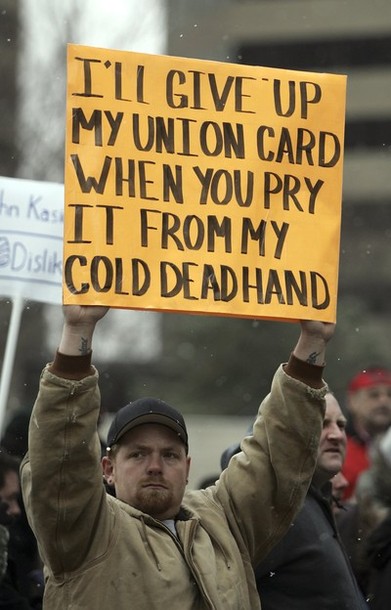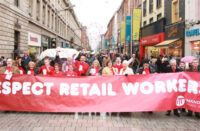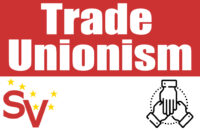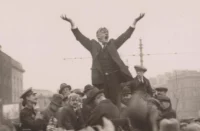There is no doubt that union density and union activity have declined drastically over recent years. The only time there was any increase was at the height of the global financial crash—and this was not an increase in total membership, it was an increase in density, resulting from the fact that good union jobs survived the recession.
Research at Harvard University in the United States found that a reduction of 1 per cent in union density leads to an increase of 5 per cent in work-related deaths. So, for reasons of health and safety alone, it is essential that trade unionism is reinvigorated.
When we talk of the lack of strike activity in Ireland, whether it be in the public or the private sector, it can be argued that this is a result of an outlook that has developed in trade unions over recent decades.
This was never clearer than when the Industrial Relations Act (1990) was brought in and accepted with minimal fuss. Unions cosied up to the state as if it were benign and benevolent towards workers.
Some have argued that the restructuring of capitalist accumulation has seen the decline or hollowing out of traditional strike-prone highly unionised industries. Alternatively, it could be said that this is because the trade union movement under “social partnership” fell asleep, while employers and capital took full advantage and introduced precarious work, low pay, short-term contracts, “austerity,” and a plethora of anti-worker arrangements that turned upside down the nature of employment in the neo-liberal race to the bottom.
The figure of 5 per cent of people being employed in limited-hour contracts is constantly quoted to imply that the other 95 per cent are in decent jobs. If only this were true!
As capitalism entered its highest and last stage, imperialism, employers found new ways to exploit workers in their lives outside the work-place, as the corporate world is now controlled by a small number of corporations, interwoven in every area of workers’ lives—not just pay and conditions but everything from housing to food prices. But it’s not always obvious.
The 12½ per cent corporation tax is promoted as a way of attracting jobs. What it actually does is rob the state of its income and its ability to provide services to the citizens.
Even if businesses did pay the full 12½ per cent, which they do not (the average is a mere 6 per cent, and some pay nothing at all), this is directly linked to state services being slashed—everything from the pension age being increased to growing housing and hospital waiting-lists, along with creeping privatisation.
Private rented accommodation is now the main form of tenure in our cities and towns. Overcrowding has increased for the first time in fifty years. A large proportion of this private rented accommodation is owned by huge private corporations. Some workers earn reasonable wages, but they are still exploited through excessive rents.
Corporations control the price of seeds, fertiliser, and weedkiller, directly affecting the cost of food. They control all aspects of life, from the financial sector to extortionate drug prices, crippling workers with debt, insurance and levies while corporations pay little or nothing to the state.
The change in the outlook of unions during the “social partnership” years facilitated them in morphing into corporate partnership, where corporations and employers, supported by the state, have all the power. Union activity is restricted by legislation while union recognition is refused, as they seek to rid the world of the only organisations capable of fighting them on equal terms.
Workers have come from the glory years of falling inequality, permanent pensionable jobs and the welfare state of the 1970s to the return of the hiring fair and the company store, with 21st-century characteristics.
A trade union member lying on a hospital trolley or forced into emergency accommodation, or left hungry as a result of cuts and poverty pay, is a worker even though they are not at the place of employment.
The 1990 act has taken control and power from the unions and handed it to the employers and the courts. It was the crowning glory of social partnership, leading to decades of mediocrity and lack of action from unions.
The act bans support strikes, secondary picketing, political strikes, sit-ins or occupations, and the element of surprise (seven days’ notice required), and allows a range of options for employers through the courts.
There is no doubt that it has led to a decline in union activity, which has led to a lack of confidence and class-consciousness among workers. When there is a strike and pickets are placed on premises it is remarkable that the great majority of people who pass the strikers are people under the age of thirty-five who have no experience of workers’ struggle, whereas older citizens would rather die than pass a picket, which they regard as sacrosanct.
Union recognition, access and full collective bargaining rights are essential; but if employers and the courts dictate when and where you can raise the odds, knowing that they can delay and thus weaken the effect of a strike, it leaves a lot of power in their hands.
The political parties and their corporate paymasters have weakened and seriously wounded the trade union movement; but we are not defeated. We are still the largest organisation in the country and over 700,000 members strong. But if workers are to break this corporate partnership we will have to fight like hell to regain lost ground.
The recent “Raise the Roof” protest jointly hosted by the ICTU can be the start of the fight back. Workers and our unions know that politicians and employers act in their own corporate interests. Unions have to go back to their roots and lead the struggle in this class war that is being waged against us—a war that we are losing.
There is no point in walking into this with our hands tied behind our backs. The 1990 act must be abolished. Unions must go on the offensive and come out of defensive mode, which has lost us so much.
As Connolly wrote, “governments in capitalist society are but committees of the rich to manage the affairs of the capitalist class.” it is not in the interests of the political classes to give extra powers to trade unions. They want to smash unions. This is why they deny the right to union recognition, the right of access, and full collective bargaining rights. For the same reason they introduced the 1990 act. If it is abolished it will allow us to fight for recognition and other rights on our terms.
The political parties will not deprive their paymasters of lucrative income by building universal public housing or properly financing the public health service, transport, or education. They prefer to return corporation tax to the corporations by means of state subsidies to low pay (FIS), excessive rents (HAP, RAS), and medical costs (DRS).
We will have to fight for these rights. We should not be so far ahead of workers that we are out of sight, or left behind, redundant and defeated; but we must be right up in front, leading the working class out of the misery and poverty of neo-liberalism to equality, decency and dignity in our lives.






